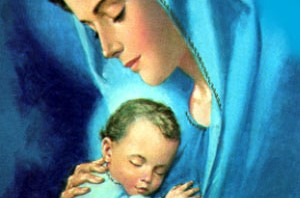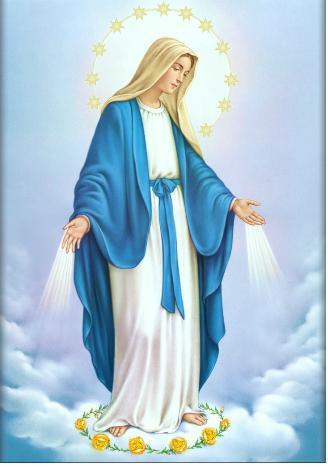The Church gives us this wonderful feast of Mary, the Holy Mother of God, on this, the octave day of Christmas. In a very real way, the Church still celebrates this day as Christmas day – that’s one of the wonderful things about being Catholic. We don’t have to cast off Christmas with the wrapping paper; we don’t toss the trees out on the curb on December the 26th; we get to celebrate for many days. But to celebrate the eighth day of Christmas as the feast of Mary, the Holy Mother of God is a wonderful and appropriate thing to do. We all know that Mary’s faith made possible our own lives of faith and even more wonderfully made possible the salvation of the whole world and everyone ever to live in it. She was the one, chosen by God, to see the Gospel come to life before her very eyes. She held our God in her faithful and loving hands, treasuring each moment in her heart.
So Mary’s faith is a model for us. We often do not know where God is leading us, but in faith we are called to say “yes” to his plan for us anyway. How willing are we to do that? We are often called upon to take a leap of faith, make a fiat, and cooperate with God’s work in our lives and in the world. Just like Mary, we have no way of knowing where that might lead us; just like Mary, that might lead to heartache and sorrow; but just like Mary, it may lead to redemption beyond belief, beyond anything we can imagine.
And so, yes, Mary is the Mother of God. And let me tell you, this was a doctrine that came at great price. People fought over whether a human woman could ever be the mother of God. How would that even be possible? But the alternative, really, would be to insinuate that Jesus was not God, because we clearly know that Mary was his mother. So to say that Mary was not the Mother of God is to say in a very real and theologically dangerous way that Jesus was not God, and we know that’s just wrong. Jesus was fully human but also fully divine, his human and divine natures intertwined in his person without any separation or division or elevation of one nature at the expense of another. And so, as theologians teach us, Mary is the Mother of God the Word according to his human nature. She didn’t give birth to his divine nature; that was begotten by God. She is not the mother of the First or Third Persons of God; she is the mother of the Second Person, God the Word. Sister Sarah made us memorize all this in seminary, and every once in a while, when I’m feeling particularly theologically courageous, I reflect on this doctrine and marvel at its beauty.
So, Mary is the Mother of God, but Mary is also the Mother of the Church, leading its members to her son Jesus and to faith in God. She is mother of priests, caring for us in a special way and interceding for the faithful work of our calling. She is the mother of mothers, interceding for them and showing them how to nurture faith in their children. She is the mother of the faithful, showing us how to cooperate fully with God’s plan. She is mother of Scripture scholars and those who just love the Scriptures, having seen the Word unfold before her and treasuring it in her heart. She is the mother of disciples, having been the first of the disciples and the most dedicated of them all. She is the Mother of God, and our mother, and we cannot sing our Christmas carols without singing her praises too. We honor her faith and example today, and we ask for her intercession for our lives, for our families, for our Church and our world.
Pray for us, o holy Mother of God, that we may be made worthy of the promises of Christ.



You must be logged in to post a comment.